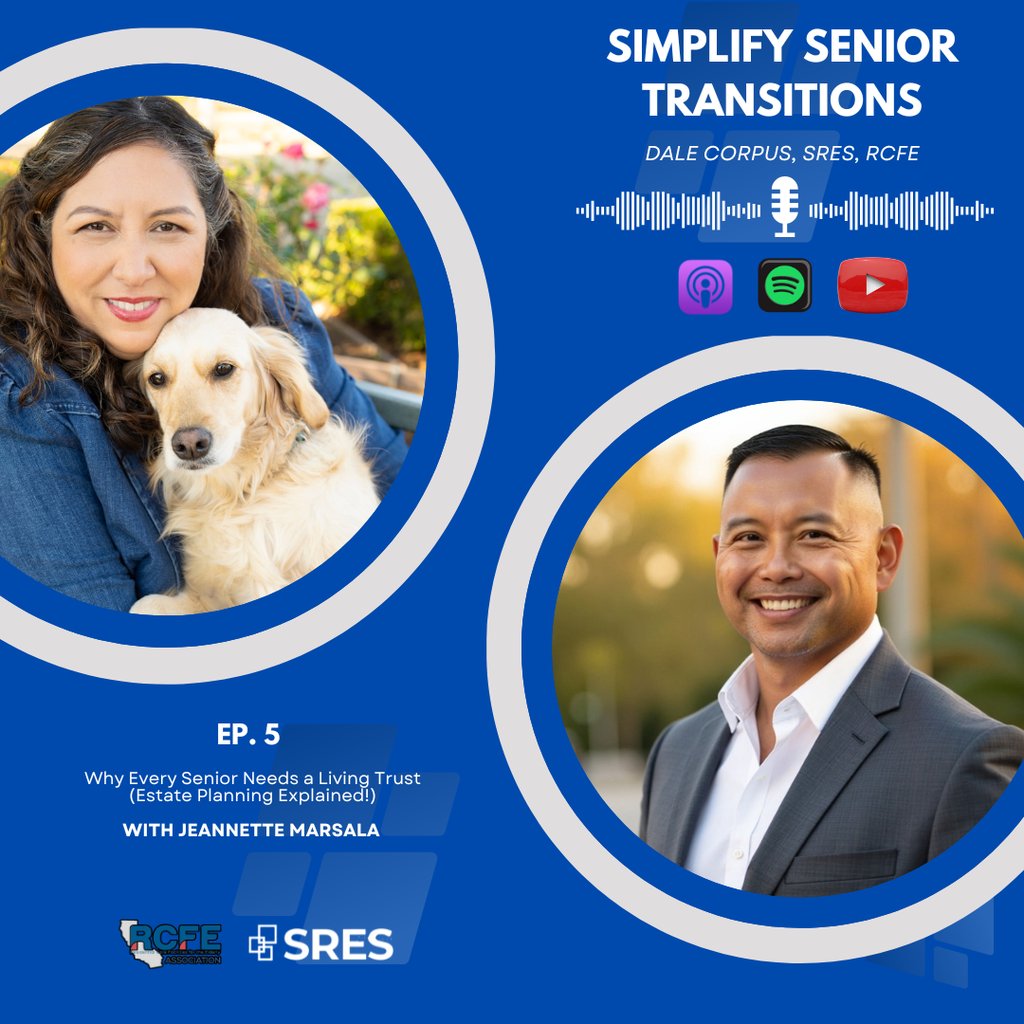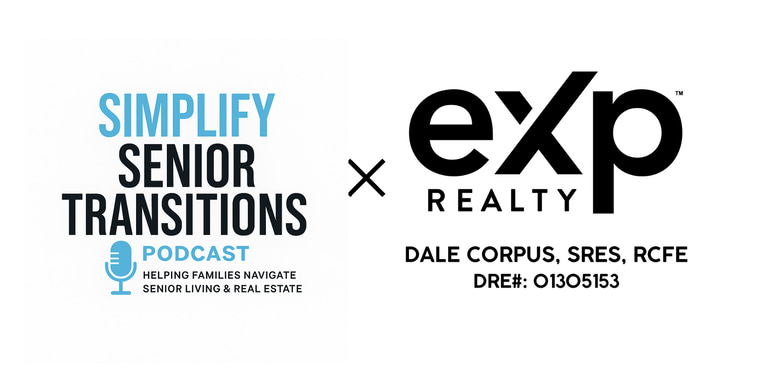Why a Living Trust Is the Most Important Gift You Can Give Your Family
Estate planning attorney Janette Marsala explains how the right legal tools can protect your aging parents, their home, and your peace of mind
Dale Corpus
3/17/20254 min read
Navigating Senior Transitions: Why a Living Trust is Your Family's Best Ally
As adult children, helping our aging parents navigate their next life chapter, whether it's considering in-home care, moving to assisted living, or even selling their beloved home, can feel incredibly overwhelming. We want to ensure their comfort, protect their assets, and spare our families unnecessary stress. But where do you even begin with the legal and financial complexities?
On a recent episode of the "Simplify Senior Transitions" podcast, hosted by our very own Dale Corpus, we had the privilege of hearing from Janette Marsala, an experienced estate planning attorney. Janette's expertise goes beyond legal documents; she’s passionate about helping families proactively avoid pitfalls and has a deep understanding of the senior care industry. Her insights are invaluable for any family caregiver, especially those of us here in the San Francisco Bay Area (Contra Costa, Alameda, Santa Clara, San Mateo, San Francisco, Solano, and Napa counties), grappling with these important decisions.
Here's what you'll learn in this episode:
This powerful episode breaks down critical aspects of planning for your parents' future, offering clear guidance on:
Why every senior and their family needs a living trust.
The biggest misconceptions about estate planning.
How estate planning ties into senior transitions and real estate.
What families should know about probate and the tax benefits of trusts.
How the Senior Care Business Support South Bay group is creating a network for senior care professionals.
Let's dive into some of the key takeaways that can significantly ease your family's journey.
The Crucial Difference: Will vs. Living Trust
Many people mistakenly believe a will is enough. Janette clarifies that a will is essentially a letter to a probate judge. This means that after your parent passes, their assets will still go through the public, time-consuming, and expensive probate court process.
A living trust, on the other hand, is a private way of distributing assets. When you create a trust, the trust owns your assets, but while your parent is alive, they remain in charge as the trustee and beneficiary. A trust allows assets to be transferred without needing a judge's order, effectively avoiding probate entirely. This is a game-changer, especially if your parents own real estate, retirement accounts, or life insurance, as each type of asset needs a specific strategy.
The Pitfalls of No Planning: Probate and Conservatorship
Ignoring estate planning can lead to significant headaches for your family. If your parent passes away without a trust, their assets may be subjected to probate, a court process designed to ensure creditors are paid, not to help families. In Santa Clara County, even an uncontested probate can take up to 18 months and cost around 3% of the gross value of the estate. Imagine the stress of delayed access to funds or the inability to sell a home quickly due to legal processes.
But what if your parent becomes incapacitated while still alive due to advanced dementia or illness? Without a proper plan like a trust or a power of attorney, your family could face a conservatorship. This means going to court to get permission to manage their affairs, sell their home to pay for care, or access their funds. This process is cumbersome, requires extensive paperwork, and can cause delays of three to six months or more, forcing you to pay out-of-pocket for care during that time. As Janette emphasizes, we never know when "later" will be, so preparing in advance is critical because once needed, it’s too late to set one up.
Trusts and Senior Home Sales: A Smoother Transition
For families navigating the sale of a senior's home, having a trust in place is incredibly beneficial. Janette shared a powerful example: a senior client passed away during escrow. Because the house was in a trust, the successor trustee was able to step in immediately and close escrow on time, avoiding devastating delays in a volatile market. This highlights how a trust can provide immense relief and financial stability during an already stressful time like downsizing and selling a home.
Common Mistakes to Avoid
Janette pointed out some critical misconceptions that can derail even well-intentioned plans:
Thinking all trusts are alike, or attorneys are just "document drafters." Quality varies, and a good estate planning attorney provides holistic advice, not just generic documents.
Overlooking the "funding" piece. A trust can only protect assets that are actually titled in the trust. Many families make the mistake of creating a trust but failing to transfer their real estate, bank accounts, or other investments into it. This renders the trust ineffective for those specific assets, as seen in the case of a client who moved and bought a new home but didn't title it in their trust. Regular check-ins are crucial to ensure your parents' plan remains valid and properly funded.
Navigating Family Dynamics and Preventing Conflict
Estate planning is not just about assets; it’s about family harmony. A trust can help prevent conflicts by clearly designating who will be in charge (the successor trustee) and how assets will be distributed. If siblings don't get along, the trust can name a neutral third party to manage affairs, preventing "Mom always loved you best" arguments. You can even specify who receives sentimental items like family heirlooms, reducing disputes over things that "can't necessarily break and hope and share equally". It also facilitates crucial discussions about your parents' care preferences, whether it's in-home caregiving or moving to an assisted living community.
Having "The Talk" with Parents
One of the hardest parts is initiating the conversation. Janette advises that adult children understand their motivation for having the discussion. It should come from a place of genuine care and concern for their parents' well-being, not just "what's going to happen to my stuff when you're gone". Approaching it with vulnerability and explaining your worries can lead to a more productive discussion. Remember, sometimes, due to family dynamics, another trusted person might be better suited to have this conversation.
Ultimately, estate planning is a proactive step to protect your parents, their assets, and your family's peace of mind. It’s about more than just documents; it's about providing security and clarity during life's most challenging transitions.
If your loved one is considering senior living and you need to figure out what to do with their home, let's talk! Schedule a FREE consultation with Dale Corpus and his team at www.simplifyseniortransitions.com. You can also listen to the full episode for all of Janette Marcala's detailed insights, or reach out to Dale directly via Instagram @soldbydale with a quick question.
P.S. Got news or an amazing story to share? Hit us up at dale.corpus@exprealty.com and you might be featured in our next episode! Remember, always check out the transcript for detailed insights. Happy listening!
Watch The Podcast Here



Transitions Made Simple
Helping seniors transition with ease and peace.
📍 Serving the San Francisco Bay Area
📞 GET IN TOUCH
📬 STAY INFORMED
Dale Corpus, SRES, RCFE
📱 925-380-1657
📧 dale@simplifyseniortransitions.com
🕓 Available for free 15 min consultations by appointment
© 2026. All rights reserved.
Sign up for monthly senior transition tips & real estate insights.
